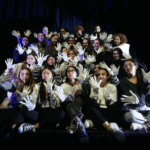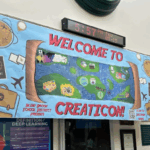During the spring religious holidays of Easter and Passover, FOCUS sat down with Revered Rabbi Alpert of Congregation KTI (Kneses Tifereth Israel) and Reverend John Bruce Baker of All Souls Parish/ Presbyterian Church to gain insight into the some of the religious figures that shape our community.
Rabbi Alpert
Q: Why did you want to become a rabbi?
A: I knew from pretty early age that I wanted to become a rabbi…I loved Jewish tradition and I wanted to be able to share that love with other people. I think a lot of times religion feels like it’s really far out there and people don’t feel like they can make it their own and I wanted to try to help people connect to this tradition I found so beautiful and also to help them find the meaning in it for themselves.
Q: What is your favorite part of being a rabbi?
A: Talking with people. I feel really blessed that I get to meet so many different people, from so many different backgrounds and so many different ages, and that I get to be with people during really important moments of their lives.”
Q: Do you think Judaism possesses a lot of the same values as other religions that are practiced in the area?
A: I think every religion is unique; we all have our different perspectives, but I work really closely with a bunch of other clergy members in the area and I’m amazed at how often we share perspectives…so I do think there is the Westchester perspective and there is the lens of religion but I feel really fortunate to have colleagues who are really dedicated to building a community.
Q: How did your community growing up affect your Jewish lifestyle and values?
A: I was really active in my synagogue as a kid. We had a junior congregation every Shabbat morning… Once I got into middle school and high school I was really active in USY (United Synagogue Youth) and my synagogue had a big USY chapter so I made a lot of my friends there. I think for me the synagogue was very supportive of me, and [of] what I wanted to do. I know it’s unusual, but I actually really enjoyed reading Torah as a kid, and as a teenager they let me read Torah and I liked leading services. When my cantor went on vacation sometimes I got to lead services, so I felt pretty supported by my synagogue community and also my camp community. I also went to Solomon Schechter through the eighth grade, and my community there was amazing.”
Q: How have your religious values changed as you have grown up?
A: I am more open now to different expressions of Judaism and religions in general. When I was growing up all I really knew was conservative Judaism…Over the years I have learned …that there are so many different ways to practice and to be Jewish or to be a person of faith, whatever that faith is and I appreciate having a more open mind.
Q: What makes KTI different from the other temples in the area?
A: It’s a really amazing place. It has such a long history and there are people here who go back six generations, which I think is very unusual for a synagogue and I think that’s something we should be proud of. I think also [that] we are homey. I think a lot of people really feel like this is their home away from home, and I love that about KTI. I think that’s one of the greatest things that we can do to really help people feel like they belong here.
Reverend John Bruce Baker
Q: Why did you choose to become a reverend?
A: That is hard to answer. I knew when I was four years old that I wanted to be a pastor. I am not sure why, I just know that I had that call and I never really considered any other career.”
Q: How did your community growing up affect your Christian lifestyle and values?
A: I grew up in a small town in Ohio in the 50's where just about everyone went to one church or another. We memorized the Ten Commandments in school and said the Lord's Prayer in grade school, as I recall. There was an expectation that you would be religious, but it was often more of a cultural religion. I think my lifestyle and values came more from my family than anywhere else. We did have Sunday school and confirmation classes where I had more questions the older I got, especially about who was “saved,” and who wasn’t, and why.
Q: How have your religious values changed as you have aged?
A: They have become more inclusive in terms of others who are seeking to find their way. But in terms of the justice and peace to which I/we are called, that has remained constant and [has] grown stronger.
Q: What makes All Souls different from other churches in the area?
A: This congregation has an incredible balance of spirituality and social justice at the very core of who they [and] we are. I have worked in the church since 1970 and will [have been] ordained forty years in October, but I have never worked with or seen a church that has held both of those values so firmly. The call to justice comes from the deep spiritual center that is here and that is rare, to say the least.”
Q: What is your favorite part about being a reverend?
A: I have the honor of being with people at the most critical moments of their lives: birth and baptism, growing into adulthood at confirmation, getting married, having children, when people are ill, when they are dying, and when they are grieving…[I have] the privilege of being allowed into those most intimate of moments and being there not just as me, but as representing the whole of the church. I am not so special, but as I sit at bedsides or hold new life in my arms, I am representing the love and care of the whole of the faith community. That is an honor and has been a blessing for me.”
Q: Do you think Christianity has a lot of the same values as other religions people practice in the area?
A: In the short, yes. To me, it is as though we are all climbing up a mountain. There are different paths on different faces of the mountain and the closer we get to the top, the closer we come to people on other paths, and we begin to recognize that we are seeking the same peak. Our paths are different, but our goal is not so dissimilar. We may come from different cultures and varied backgrounds, but finally, I tend to believe that we seek much the same goal, to understand our place in the world and to seek true peace which must come with real justice.






